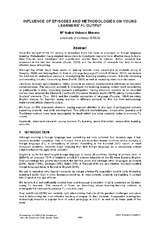Influence of episodes and methodology on learners’ foreign language output
Autor
Velasco Moreno, Mª Isabel
Editor
IATEDFecha
2016Materia
Classroom discourseInteraction
FL learning
Children
Discourse analysis
METS:
Mostrar el registro METSPREMIS:
Mostrar el registro PREMISMetadatos
Mostrar el registro completo del ítemResumen
Since the last part of the XX century to nowadays there has been an emphasis on foreign language
learning. Globalization has prompted researchers to investigate new and more effective ways to learn.
New theories were developed and practitioners applied them to classes. Action research has
increased in the last two decades (Burns, 2010) and the benefits of research has help to more
effective ways of teaching.
Although big efforts have been made on making lessons more meaningful to students (Long &
Doughty, 2009) and helping them to think in a foreign language (Puchta & Williams, 2012), we believe
the best way to understand classes is investigating the teaching-learning process. Not only observing
and recording but also, transcribing them (Harfitt, 2008) as well as analyzing classroom discourse.
Like three decades ago (Chaudron, 1988), research on classes development is still focus on teacher's
verbal behavior. This research pretends to investigate the teaching learning context itself, considering
all participants in class, especially learner's participation. Taking discourse analysis as an essential
tool we have adapted the Sinclair & Coulthard's Discourse Analysis model (1975) adding Conversation
Analysis' elements (Tsui, 1994) and the tripartite conception of language (Poyatos, 1994) we study
English classes for Spanish young learners in different contexts to find out how methodology
implemented affects student's output.
We focus on ESL classroom structure, paying especial attention to one type of pedagogical episode
searching students’ oral skills development. Two different methodologies, Cooperative Learning and
Traditional method, have been investigated to check which one helps students better to promote FL
output.

